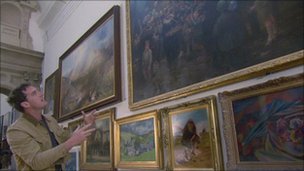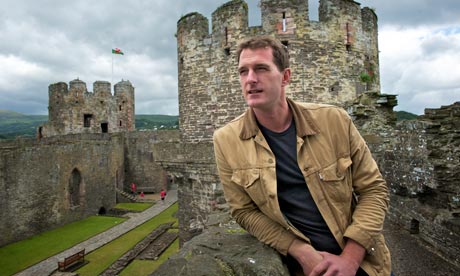From here:
The Monday Interview: The educator, AV campaigner, and royal wedding guest talks to Adam Sherwin
If the weekend’s events displayed a nation caught between tradition and modernity then there’s one historian who can surely make sense of it all. It’s been a busy few days for Dan Snow, the boundlessly-energetic BBC “history heart-throb”, scion of a famous broadcasting family and now a vocal advocate for the Yes to AV campaign.
Snow, 32, has argued for constitutional change on Newsnight and worked the phones at the Yes to Fairer Votes campaign. “We shouldn’t be attached to the past like ancestor worshippers,” he says of the first-past-the-post system.
But he also measured up his morning suit as a distinguished guest at the royal wedding, which he attended with his wife, Lady Edwina Grosvenor, daughter of the sixth Duke of Westminster. Can a hereditary monarchy, entrenched by Friday’s nuptials, sit comfortably alongside the promise of a more plural, democratic Britain offered by AV?
Snow, who has won acclaim for his military history books and documentaries, believes the secret lies in the monarchy’s adaptability. “In the past an event like this would have been a military spectacle but now it’s a family wedding,” he says.
“Marrying a middle-class girl from outside of the aristocracy shows the monarchy does change with the times and is designed for a democratic age.”
But there does need to be a change to the line of succession. “If William and Catherine’s first child is a daughter, there’s absolutely no doubt that she would become Queen, over the sovereign claim of a younger brother. If the British Parliament changes the law and the Commonwealth splits over the issue then so be it.”
It’s the kind of constitutional debate that constantly swirled around the Snow household. His father Peter tended the Newsnight swingometer on election nights and his cousin, Jon, is the Channel 4 News anchor.
Dan’s mother Ann is a Canadian journalist and he is the nephew of Margaret MacMillan, the Oxford historian. For good measure he is the great-great-grandson of David Lloyd George.
“I’ve been the luckiest person in the world because right from the earliest age my parents would talk around the table about PR, presidential democracy and monarchical absolutism,” he recalls.
“My dad is the best sounding board. We always argue but Dad is a fantastic empiricist in his own right. Of course he tells us all about voting systems and polls and he remembers the 1974 discussions about a Lib-Lab deal over PR.” When Snow left Balliol College, Oxford, with a double first in Modern History, Peter helped launch his television career, as father and son toured eight of the most famous British battlefields for a BBC series.
Dan has never looked back, bringing his authoritative, enthused approach to subjects including a well-received history of the Royal Navy and most recently Filthy Cities, a visceral journey into the sewers below Paris, London and New York.
Snow, who suffered bites from rats and leeches, is willing to make some compromises for the prize of attracting younger viewers to history. “It was an ambitious attempt, using CGI, to bring a wider audience to history on BBC2. There was a great reaction on Twitter but it was also a serious attempt to show the struggle we’ve had against filth and the progress we’ve made.” He’s observed how his television historian contemporaries, Simon Schama and Niall Ferguson, Dan’s Oxford tutor, have agreed to advise Michael Gove over the Education Secretary’s pledge to ensure that no child leaves school without learning a “narrative history”.
“My dad’s generation can list historical dates, the 1832 Reform Act and so on but they don’t know the substance behind them,” he says. “It would be a success if children could walk away from school with some understanding of how and why Britain is the shape it is today, ethnically and socially. I would like young people to be more aware of some old-fashioned constitutional history. It’s beyond my comprehension that an understanding of how and why we vote in this country is not a mandatory part of the syllabus.”
It was a letter opposing AV, signed by eminent historians including Ferguson and David Starkey that thrust Snow into the political debate. “I was bemused by this list of extremely impressive historians who made some very basic errors in a letter backing first past the post,” he says.
“They quoted first past the post as if it’s part of the legitimacy of the age. But we’ve had hung parliaments in one third of the past 100 years or so and sometimes parties volunteered to form coalitions in a crisis.
“Our democracy is the oldest in the world but we’ve never sat on our laurels. It’s evolved, we’ve franchised women, we got rid of private voting, we decided to pay MPs money.”
Is Snow a classic Liberal reformer in the Lloyd George tradition? “I grew up inspired by David Lloyd George but also Gladstone, Churchill and Atlee. They achieved extraordinary things. Paddy Ashdown is also someone I always looked up to.”
Yet he isn’t tempted to follow his fellow historian, Tristram Hunt, into Parliament. “It’s been fun getting involved in politics but I couldn’t toe a party line. I’d find the discipline of following a party doctrine tiresome.”
Snow is a dedicated advocate of social media. “I was so tempted to Tweet from inside the wedding but I’d probably never be invited anywhere again,” he reveals.
He’s been “invigorated” by the discovery that he can make a short film explaining AV, upload it to YouTube and have it seen by 10,000 people within an hour.
Snow tends to be wherever the action is. He escaped unscathed when the Syrian uprising erupted just as he was filming at the Krak Des Chevaliers in Homs in the west of the country, for a Discovery series on castles. But he balks at any suggestion that he has enjoyed a gilded rise from school captain to Oxford Boat Race star through instant television stardom and marriage into the Duke of Westminster’s £7bn estate.
“I only remember the setbacks and series of defeats,” he says. “Even when things have gone well in other respects, the number of programmes I’ve done where I’ve thought ‘this one will really break through, this will get people talking about history, this will win at the Baftas…’. And they come and go and just disappear into the ether. I think about the boat race I lost. I look at the projects the BBC said ‘no’ to, the ideas that never get off the ground. I wish the YouTube AV videos had 250,000 hits instead of 10,000.”
Today, Snow will be clambering in typical action-man style across Château de Gaillon in Normandy, “One of the most beautiful renaissance castles. Trashed in the revolution.” He adopts a military analogy to assess his own prospects. “The great generals get better because when they get setbacks for reasons out of their control they regroup, they keep coming back and they keep an eye on the final victory.
“George Washington suffered defeat after defeat but he never let himself get disillusioned. Historical parallels help us in our lives. I look at the towering statesmen such as Churchill. So one day I will write the book that blows everyone’s mind.”
A life in brief
* Born December 1978, youngest son of BBC journalist Peter Snow and Canadian journalist Ann MacMillan.
* Educated St Paul’s School, London and Balliol College, Oxford where he rowed three times in the Boat Race.
* Makes television debut alongside father in 2003 BBC film about El Alamein, followed by Battlefield Britain series.
* Snow and friends took three boats from Dover to Calais to help people stranded by the air-travel disruption caused by volcanic dust in 2010
* Married Lady Edwina Grosvenor, daughter of the Duke of Westminster, in November 2010


